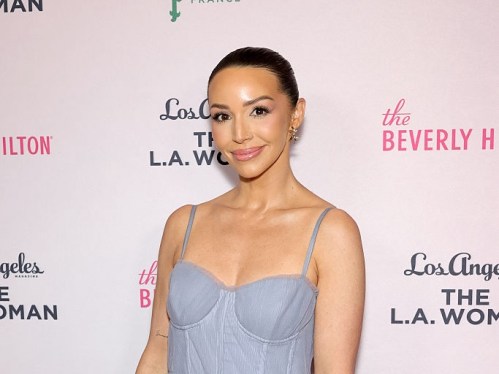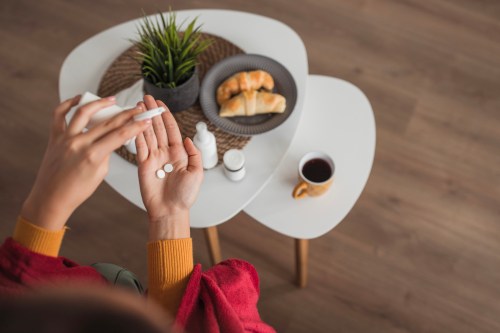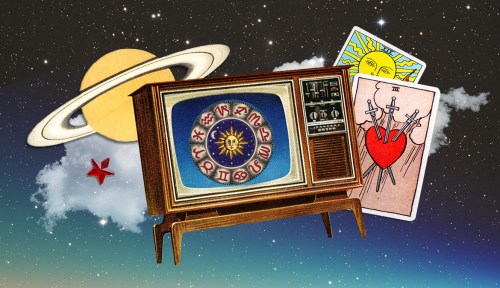Your coworker swears by it, so you decide to try their solution to the midday tiredness, hoping for that energy boost everyone talks about: a cup of coffee. But strangely, after drinking that coffee, you’re even more tired than before. What’s up with that?
Experts in This Article
registered dietitian and senior regulatory specialist at Physician’s Choice
national medical director at digital sleep clinic Dreem Health
registered dietitian at MyNetDiary
Coffee contains caffeine—about 95 to 200 milligrams (mg) in an 8-ounce cup—and is a stimulant. It’s supposed to keep you alert. So why does it seem to have the opposite effect on some people?
Curious about this caffeine contradiction, we asked the experts. Turns out it’s not all in your head, and there are perfectly legit reasons why coffee can make you sleepy. But there are ways to perk up if you get that post-caffeine energy drop.
Why coffee makes you sleepy
Some people may feel sleepy after drinking coffee because their bodies process caffeine differently, Hayley Miller, MS, RDN, LD, a registered dietitian and senior regulatory specialist at Physician’s Choice in Denver, Colorado, tells Well+Good.
Your unique genetic makeup, how often you drink coffee, and even underlying health conditions can flip that cup of joe’s effects upside down, she explains. Let’s break it down.
High caffeine tolerance
If you’re a regular coffee drinker, your body may have simply gotten used to caffeine. “People who regularly consume caffeine may be less sensitive to its effects,” Amy Brownstein, MS, RDN, a registered dietitian at MyNetDiary, tells Well+Good.
That means one cup of joe might not give you the same kick it used to. Instead of feeling a jolt of energy, you might feel…nothing. And, now you need more coffee just to feel awake, though that can lead to other issues, like increased tolerance or disrupted sleep.1
The rebound effect
Throughout the day, your brain makes a chemical called adenosine. When enough adenosine builds up, you start feeling tired.2 Caffeine helps keep you awake by temporarily blocking the receptors in your brain where adenosine usually works.3
Once the caffeine wears off, it’s possible that all that built-up adenosine that was blocked comes flooding back at once, says William Lu, MD, a sleep medicine physician and medical director at Dreem Health.
And if you drink coffee regularly, your brain might actually make more of those adenosine receptors over time. This could leave you even more sensitive to adenosine’s sleepy effects once caffeine is no longer blocking the receptors.
Underlying sleep problems
Sometimes feeling sleepy after coffee is a clue to a deeper problem. If you’re not sleeping well—say, due to an underlying condition like obstructive sleep apnea—you might feel constantly fatigued, no matter how much caffeine you consume, Dr. Lu notes.
So, if coffee never seems to cut through your exhaustion, it might be worth chatting with a sleep specialist about what’s really going on.
Dehydration
Caffeine can have a mild diuretic effect, meaning it can increase how often you pee. However, scientists are still debating just how much caffeine it takes to tip the scale toward dehydration, with some newer studies suggesting it’s not as bad as we once thought.4
Still, over time, especially if you’re not drinking enough water, drinking coffee can lead to dehydration, Dr. Lu explains. And guess what’s a common symptom of dehydration? Fatigue.
So, if you’re hitting that afternoon wall after your second cup, it might not be the coffee itself—it could be your body’s way of asking for a little more hydration support.
Sugar spikes and crashes
A lot of us take our coffee with a generous pour of flavored creamer, syrup, or sugar. While sweet coffee can feel like a treat, it can also set you up for a sugar crash.
“Adding significant amounts of sugar can cause blood sugar spikes followed by crashes,” Brownstein says. A sugar crash is when your blood glucose drops below normal, otherwise medically known as hypoglycemia. You might experience low energy levels and feel sleepy with that crash.
Stress
When you’re stressed, your body is already pumping out adrenaline as part of your fight-or-flight response, Brownstein explains.5 Adrenaline is a stimulant, and your system is already on high alert all by itself.
Now toss in a few cups of coffee, and you’re basically stacking stimulants. Too much caffeine can crank up stress hormones like adrenaline and cortisol even more.6 Sure, you might feel super alert for a bit, but this energy spike doesn’t generally last. Once it wears off, you might feel more drained than before that cup of joe.
Sleep disruption
A review of studies found that caffeine can make it harder to fall asleep and change how well you sleep.7 That said, the researchers also pointed out that regular coffee drinkers don’t always see major sleep problems—at least not when they stick to drinking caffeine earlier in the day (ideally no later than four to six hours before bed).
Another review of studies noted that, on average, people who consume caffeine lose about 45 minutes of sleep per night and wake up more often during the night. It also takes longer to fall asleep, and the sleep you do get tends to be lighter with less of the deep, restful kind. This can leave you feeling unrested even after a full night's rest.8
This can create what Brownstein calls a “vicious cycle.” Feeling tired prompts you to drink more coffee, which disrupts your sleep, leaving you more tired the next day, so you reach for even more coffee. Breaking this cycle often means taking a hard look at when (and how much) caffeine you’re consuming.
Caffeine withdrawal
Just cutting back on your usual coffee consumption (not even quitting entirely) can trigger a bit of caffeine withdrawal symptoms that feel a lot like sleepiness. Even delaying your usual morning cup by a couple of hours can be enough to cause a mini withdrawal response. These withdrawal symptoms can kick in just 12 to 24 hours after reducing your caffeine intake. Common symptoms include headaches, fatigue, difficulty concentrating, irritability, and a general foggy feeling.
If you normally drink coffee throughout the day but scaled back or changed your routine, what feels like “coffee making me sleepy” could just be withdrawal from getting less than your usual amount.
Fast caffeine metabolism
Here’s something else to consider: your genes. Some people are just born with genes that process caffeine super quickly, Brownstein explains. That means your body clears caffeine faster, and the effects wear off sooner than you expect.9
So, while your friends are buzzing, you might be battling sleepiness because your body has already moved on from that cup of coffee.
10 ways to feel energized if coffee makes you tired
If your morning (or afternoon) cup of coffee leaves you yawning, our experts have some practical suggestions that might help you feel more energized without relying on caffeine to get through the day:
- 1.Get good sleep: All three experts emphasize getting quality sleep, as this is the foundation of natural energy.
- 2.Have good sleep hygiene: Stick to a consistent sleep schedule, create a calming bedtime routine, like keeping your room cool and dark, and limit screen time before bed, says Brownstein.
- 3.Remember to drink water: Stay properly hydrated throughout the day, Miller advises. Feeling fatigued after drinking coffee may be a sign your body needs water, not more coffee.
- 4.Go outside more often: Step outside for sunlight and a quick walk—both can give your energy a natural boost, all three experts agree.
- 5.Consider switching to tea: Swap out your regular brew with green or black tea for a gentler lift, Miller says. “These beverages contain less caffeine and can provide a light energy boost without the jittery side effects that may come with coffee,” she notes.
- 6.Revamp your meal plan: Eat balanced meals with complex carbohydrates on a regular schedule to help stabilize blood sugar levels, Brownstein recommends.
- 7.Reduce sugar intake: Cut back on sugary add-ins to your coffee, which can lead to crashes later, says Brownstein.
- 8.Squeeze in a nap: Consider short 20-minute naps if you’re running on empty, but don’t skip out on quality nighttime sleep, Dr. Lu says.
- 9.Don't drink coffee before bed: Stop consuming caffeine at least nine hours before bedtime to help regulate your sleep cycle, Brownstein advises. And be even more careful with pre-workout supplements, which can contain higher doses of caffeine that can affect your sleep for as long as 13 hours.
- 10.Gradually slow down: If you decide to cut back on coffee, do it gradually to minimize withdrawal symptoms like headaches and fatigue, cautions Dr. Lu.
If you’re constantly reaching for coffee to function, it might be time to check in with a healthcare provider about possible sleep issues, like sleep apnea, Dr. Lu adds. Your provider will be able to order diagnostic tests, evaluate your symptoms, and recommend treatment if needed.
The bottom line
If the idea of being sleepy after drinking coffee sounds backward, it’s actually not—and there are plenty of reasons your cup of joe might be backfiring. High caffeine tolerance, adenosine rebound, hidden sleep issues, dehydration, and even your genetic makeup can all play a role in how caffeine affects you.
But the fix doesn’t have to be complicated, as there are ways to boost your energy without caffeine. Getting enough sleep, drinking more water, stepping outside for some sunlight, and eating balanced meals might help more than an extra cup of coffee for some people. And if you’re always tired no matter what, talk to your healthcare provider just to be sure there’s nothing else going on.
- Sajadi-Ernazarova, Karima R. and Richard J. Hamilton. “Caffeine Withdrawal.” StatPearls, StatPearls Publishing, 8 August 2023. ↩︎
- Lin, Yu-Shiuan et al. “Repeated caffeine intake suppresses cerebral grey matter responses to chronic sleep restriction in an A1 adenosine receptor-dependent manner: a double-blind randomized controlled study with PET-MRI.” Scientific reports vol. 14,1 12724. 3 Jun. 2024, doi:10.1038/s41598-024-61421-8 ↩︎
- Huang, Lishan et al. “Functions and mechanisms of adenosine and its receptors in sleep regulation.” Sleep medicine vol. 115 (2024): 210-217. doi:10.1016/j.sleep.2024.02.012 ↩︎
- Antonio, Jose et al. “Common questions and misconceptions about caffeine supplementation: what does the scientific evidence really show?.” Journal of the International Society of Sports Nutrition vol. 21,1 (2024): 2323919. doi:10.1080/15502783.2024.2323919 ↩︎
- Chu, Brianna, et al. “Physiology, Stress Reaction.” StatPearls, StatPearls Publishing, 7 May 2024. ↩︎
- Raza, Muhammad Liaquat et al. “Coffee and stress management: How does coffee affect the stress response?.” Progress in brain research vol. 288 (2024): 59-80. doi:10.1016/bs.pbr.2024.06.013 ↩︎
- Reichert, Carolin Franziska et al. “Adenosine, caffeine, and sleep-wake regulation: state of the science and perspectives.” Journal of Sleep Research vol. 31,4 (2022): e13597. doi:10.1111/jsr.13597 ↩︎
- Gardiner, Carissa et al. “The effect of caffeine on subsequent sleep: A systematic review and meta-analysis.” Sleep medicine reviews vol. 69 (2023): 101764. doi:10.1016/j.smrv.2023.101764 ↩︎
- Low, Jazreel Ju-Li et al. “Genetic susceptibility to caffeine intake and metabolism: a systematic review.” Journal of translational medicine vol. 22,1 961. 22 Oct. 2024, doi:10.1186/s12967-024-05737-z ↩︎
Sign Up for Our Daily Newsletter
Get all the latest in wellness, trends, food, fitness, beauty, and more delivered right to your inbox.
Got it, you've been added to our email list.










